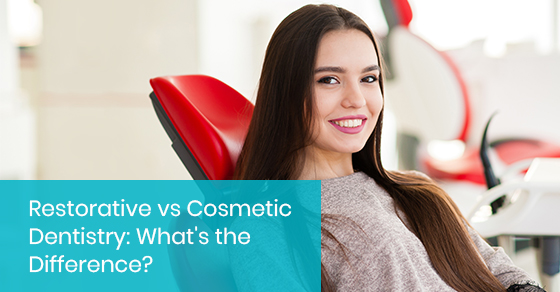Many patients are unclear on the terms restorative and cosmetic mean when it comes to their dental treatments. For example, many restorative treatments are used for cosmetic purposes. So what is the actual difference between the two?
An easy way to explain it is that restorative treatments are required to keep your teeth healthy and maintain proper function. In contrast, cosmetic treatments are “elective” and performed strictly for aesthetic purposes. Here we help explain the purpose of both dentistry types and why you might consider including both in your treatment plan.
Restorative Dentistry
Your dentist looks for issues with your teeth, including damage, structural issues, missing teeth, infections, gum disease, bite issues, alignment issues and more. Their goal is to ensure your dental health is optimized, and they will recommend restorative treatments to repair teeth and bring them back to their proper function. Restorative treatments most commonly used to repair teeth include:
-
Fillings
Dental fillings fill holes in the teeth caused by decay and cavities.
-
Root canals
A root canal is required when a tooth’s damage is so deep it reaches the soft inner pulp of the tooth. This can lead to infection, and the pulp must first be removed and then sealed with a filling, and often a crown.
-
Onlays
An onlay is a pre-moulded “filling” used to cover one or more damaged or missing “cusps” on your tooth. They are also referred to as a partial crown.
-
Inlays
Like onlays, inlays are pre-moulded but are used on the fitted grooves of a tooth, but do not extend over the biting surface.
-
Crowns
Crowns are a hollow, artificial tooth used to restore teeth that are either too damaged or have too much decay to be fixed with a filling or onlay/inlay.
-
Bridges
A bridge is used to replace a single missing tooth or string of missing teeth affixing crowns over the healthy teeth on either side to insert the artificial tooth or teeth.
-
Dentures
Dentures are removable artificial teeth that can be used for your entire mouth or a single missing tooth.
-
Implants
Implants are used as a permanent artificial tooth using posts inserted into the bone to mimic your natural tooth root. Dentures or artificial teeth are then attached to the posts.
All these treatments are performed out of a need to restore your teeth’s health, as opposed to a desire to improve your smile.
Cosmetic Dentistry
Cosmetic dentistry provides you that winning smile with perfectly aligned white teeth. The treatments provided are based on individual needs and can be used to address a mouthful of woes, including gaps, crowding, crooked teeth, high or low gums, discolouration and staining, and more. Some common treatments to resolve cosmetic issues include:
-
Teeth whitening or bleaching
Available in both in-home and office treatments, this is the fastest route to getting a dazzling white smile.
-
Veneers
Veneers apply a thin layer of composite or porcelain over your tooth to improve the appearance of many issues, including gaps and discolouration, as well as small chips.
-
Bonding
Tooth bonding uses composite resin applied to the tooth often used to correct chipped or severely discoloured teeth.
-
Straightening
Straightening (or orthodontic) treatments are easier today as you have a choice between traditional metal braces, as well as clear aligners used to ease teeth into the ideal position.
-
Contouring
Contouring allows us to reshape your teeth to make them even and more aesthetically pleasing by altering the position, width, length, or shape of the tooth. This includes sanding and the use of lasers to correct many issues such as crooked teeth, overlaps, different lengths, or undesired angles.
Crowns and bridges, as well as implants or dentures, are also commonly used for cosmetic treatments.
Things to Consider for Cosmetic Dentistry
Cosmetic dentistry can be expensive, so speak to your dentist to learn about the different options and costs. They can provide a treatment plan based on your needs, but also suited to your budget. Not all cosmetic treatments will work for all patients. That’s why a consultation is so important. Your dentist will provide options that will work best for you. Some considerations based on each treatment include:
-
Teeth Whitening
This works for any discolouration or stains on tooth enamel. However, if you have a lot of fillings, crowns, or veneers, you can’t use this option as your restorations will not be affected by the bleach. Also, if you suffer from tooth sensitivity, this option is not for you. Other options might include veneers or bonding.
-
Bonding
Your dentist may recommend this for small chips and minor discolouration. It’s an excellent option to correct minor issues and greatly improve your smile. Bonding can last for many years, but will eventually require replacement.
-
Contouring
You can only get contouring if you have strong, healthy teeth and gums.
-
Veneers
While this is a great way to correct several woes, if you tend to grind your teeth, this is not the solution for you. It is easy to damage your veneers if you grind, but in some cases, bonding might work.
Full Mouth Treatments
Many of our patients are looking for full mouth treatments to address a long list of restorative and cosmetic needs. While much of the restorative work also addresses cosmetic issues, we can review all options and add additional treatments such as contouring or perhaps straightening.
Preventative Dentistry
We’d like to add one more type of dentistry to the list, as we think it is probably the most important: Preventative dentistry. Preventative dentistry is the proactive approach to dental health, with regular checkups and cleaning that keep us up to date on changes in your dental and oral health.
When you visit your dentist regularly, you avoid the need for restorative treatments, which can help you avoid the need for cosmetic treatments in some cases. When it comes to the appearance of your smile, take a proactive approach. At each appointment, discuss new options to help improve the appearance of your smile.
And don’t forget the most basic steps of preventative care: brushing and flossing. With regular preventative care, you can keep on top of your dental health and maintain a pleasant smile with healthy gums.
If you would like more information about cosmetic and restorative dentistry treatments available, call Bristol Dental at 905-712-3409 or contact us here.






Well I really liked studying it. This subject offered by you is very effective for proper planning. Clovis Gregory Skye